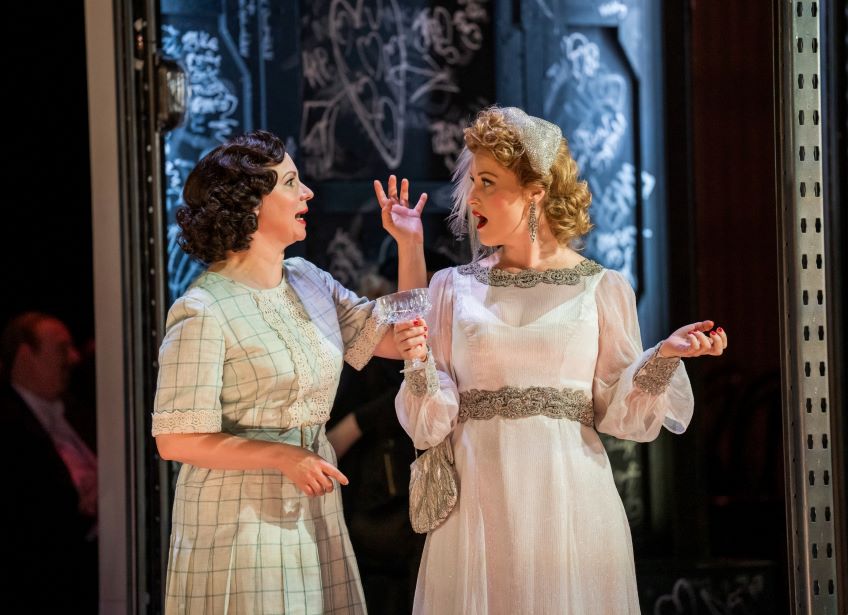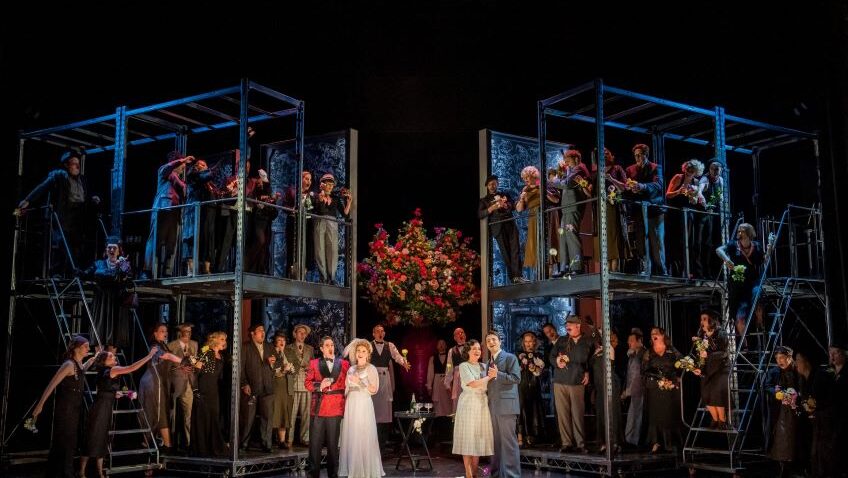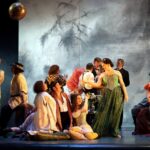This third production in Opera North’s Green Season with its emphasis on recycling and reusing sets and costume is a visually splendid, warm entertainment, showcasing magnificently, not just soloists, but also the superb, top talents of the entire chorus and orchestra, who contribute immensely to the piece’s overall liveliness and charm. The stage is peopled frequently with chorus members gloriously displaying their considerable acting, singing and dancing skills as students, artists, happy-go-lucky revellers, waiters and dancers, while four impressively choreographed professional dancers also bring alive the early twentieth-century, pleasure-seeking Parisian scene with a cart-wheeling energy of flamboyant flingings and supple drapings.
Fame and fortune came to Giacomo Puccini (1858-1924) thanks primarily to his immense talent for creating epic operas like La Boheme (1896), Tosca (1900) and Madama Butterfly (1904). Full of tear-jerking, emotional dramas of love, loss, suffering and tragedy, they sing out and ring out in powerful flows of lyrical music. So when, in 1913, Puccini was asked to come up with an operetta for Viennese audiences, a genre made popular through works like The Merry Widow (1905) and Der Rosenkavalier (1911), he was less than keen: operettas full of frivolous banality, satire, wit and spoken words that interrupt flow didn’t really appeal to him. But in composing La Rondine (The Swallow) as a light opera, he embraced exploring a lighter, more playful side to his music and mood whilst also injecting an element of weightier drama. With WWI ongoing, the work premiered in 1917 in neutral Monte Carlo and went well but, being somewhat a hybrid, it’s since been less frequently staged than other works.
The storyline echoes somewhat Verdi’s La Traviata. Courtesan Magda, the metaphorical swallow, is a kept mistress to wealthy banker Rambaldo, but oh, how she longs for true love even if it means rejecting riches. Now, enter by chance a lovely young chap, Ruggero – played by Sebastien Guese, smiling with pure, wide-eyed innocence like Father Dougal McGuire in Father Ted – and ping! – in no time they’re deep in love. But will there be an idyllic happy ever after in a world that emphatically demands purity in women once Ruggero learns of Magda’s tainted past? And what will happen to Magda’s lowly maid Lisette who falls for (as he sees himself) a lofty poet? This sentimental tale unfolds unsubtly, even clumsily at the outset, but a more credible intimacy emerges between Magda and Ruggero in the final act, bringing a more involving emotional drama, and ultimately, as the swallow flies, the final scenario is quite moving. Puccini later came up with alternative endings but this production keeps to the original.

The fabulous orchestra and conductor Kerem Hasan serve up all manner of delights as, for lighter mood Puccini employs rhythms and instruments (kettledrum, flutes, tubular bells, bassoon) with playful, pleasing humour and reflecting popular dance styles of the day, yet also creates deeper emotional impact with powerful, big-voice moments for chorus, ensembles and soloists. Soprano Claire Lees, a vivacious, likeable Lisette, sings with twinkling bright clarity while Galina Averina is an engaging Magda with fuller-bodied tone. Special tenor moments come for Elgan Llyr Thomas as he struts his stuff firmly as poet Prunier, and for Sebastien Guese as sweet, enamoured Ruggero. Further vocal pizzazz comes courtesy of the impressive, lively, well-clad trio of Yvette, Bianca and Suzy (Pasquale Orchard, Kathryn Sharpe, and Laura Kelly-McInroy) while the impact of the chorus’s big Bevo Al Tuo Fresco Sorriso is phenomenal.
Costumes of infinite interest and variety range from opulent gold and glitter, silken embroidery, feathers, jewels, dinner suits and smoking jackets to boaters, berets and outfits more plain and restrained. Meanwhile, to take us from cocktail party salon to thronging dance hall, graffito wall or bedroom, Leslie Travers’ attractive, versatile set is tweaked and reconfigured, lighting choices evoking music hall shadows, sunrise and Riviera brightness. The main mesmerising focus for the first two acts is on a giant vase of beautiful flowers, while elegant, bright white structures tower up like organ pipes, flanked by metal frameworks that create extra rooms and stairways on two levels, where superbly integrated ensemble performances add constant interest. Flowers and chairs feature large, too, but alas, Falstaff’s tatty caravan from the last two productions can find no place in Paris salon or Riviera.
Following the performance, Opera North’s general director Sir Richard Mantle spoke to say that on December 1st he is stepping down after thirty years. The Yorkshireman glowed with pride as he reminded everyone that Opera North, one of the UK’s foremost opera companies, not only brings top-class opera to northern cities (like Leeds, Nottingham, Newcastle and Salford) but also maintains a world-class orchestra and chorus and runs extensive educational and community projects. The company, founded in Leeds by ENO itself, Sir Richard said, was a major step in “levelling-up” – and it happened 45 years ago! Making an earnest plea on behalf of ENO, he described the chaotic situation in which their funding has been halved and will be awarded only if ENO relocates its base out of London. All hangs in the balance.
La Rondine is in Leeds until Oct 28th then tours to Newcastle, Nottingham, and Salford with Falstaff and Masque of Might. For more information follow this link.
Eileen Caiger Gray




